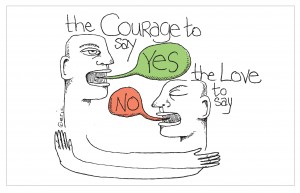Today’s post is written by Eric Klein. Along with being a spiritual teacher, for the past two decades, Eric has been a leading voice in the movement to bring greater spirit, meaning, and authenticity to the workplace through his company Dharma Consulting.
When I was six years old I loved Roy Rogers. I wanted to be a cowboy. I longed to sleep out on the range. But I lived in a New York City apartment. So in lieu of nights under the stars, my mother let me set up a tent and camp out in the living room.
The hardwood living room floor was uncomfortable.
But that very uncomfortable-ness was satisfying. Whenever I felt my bones rubbing against the hard floor, I knew I was getting closer to being a cowboy.
What does sleeping on hardwood have to do with freedom and getting unstuck?
Getting unstuck is a learning process.
And all learning includes uncomfortable moments.
When you’re learning a new way of being in the world, it’s inevitable that you’ll be clumsy at first. You’re out of your depths; your nervous system is working hard to wire in the new way of thinking and acting.
Whenever you take on a new behavior, new project, or a new way of relating to your life – you won’t have it mastered on day one. You’re at the base of a learning curve and walking your way up will include some stumbling. It’s not the stumbling that makes you uncomfortable.
Stumbling and bumbling doesn’t have to feel uncomfortable.
In fact, it can be very satisfying. It’s your interpretation that counts. When I rolled over onto the hardwood floor and bruised my hipbone – I took that as a sign of progress. I was that much closer to being a cowboy.
What makes being uncomfortable satisfying?
When you recognize that the discomfort is taking you closer to your goal. When you understand the discomfort as a signal that your body/mind is working intensely to build new patterns. Then you’ll gladly lean into your discomfort.
You’ll seek out experiences and opportunities where you can lean into your discomfort.
Not simply to feel the hardwood rubbing against your ribs but because you want to grow, learn, and develop. And opportunities abound. Think about a conversation that you know you’re going to have in the next three days. Pick one that is important and that will take both courage and skill on your part if it is to go well.
Let yourself sense the energy that starts swirling in your body.
When you bring the upcoming situation to mind – intensely picturing and feeling it – you’ll activate your body/mind. As neurobiologists tell us, even if the intensity seems to be less than when you’re in the “real” situation, the neural pattern is the same.
Because your neurology doesn’t distinguish between being in that conversation and thinking about it.
The same neurological patterns are stimulated whether you’re having the person-to-person encounter or imagining it.
This is good news!! You can start to lean into your discomfort before you walk through the door. You can begin to change your experience – before you’re in the conversation. You can begin to develop new and more creative responses – in the privacy of your own awareness. Explore through your imagination what it would look like for you to show up in that conversation with just a bit more courage.
Picture what it would look like.
What you would do, how you would move, speak, interact. Inwardly, push yourself just a bit. Lean into your discomfort and let your neurology system experience a new way of being in that situation. Remember – practicing this new way in your imagination builds actual neural pathways that support new ways of behaving and interacting.
You can do this in 60 seconds.
Make an appointment with yourself a few times a day. Just lean into your discomfort in the privacy of your own mind. By intentionally and mindfully leaning into your discomfort, you stimulate your body/mind and catalyze inner experiences that develop greater flexibility and choice. Notice how you approach the conversation differently.
Remember, the idea is to lean into your discomfort.
Not to radically transform yourself overnight. Learning doesn’t happen that way. You build mastery incrementally. By leaning into your discomfort not by leaping over it.
Because you don’t have to become a full-fledged cowboy overnight.
Eric Klein is the author of the new FREE ebook: 50 Ways to Leave Your Karma: Freedom, Fear, and the Art of Getting Unstuck. Get your copy – www.wisdomheart.org/50Ways

